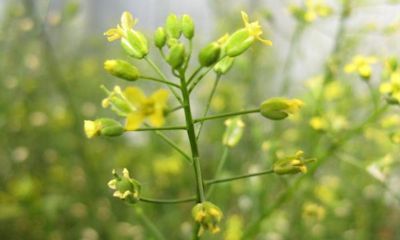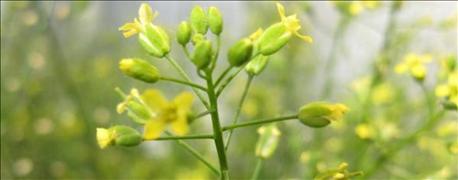March 17, 2016

Edgar Cahoon, professor in the University of Nebraska-Lincoln's Department of Biochemistry and director of the Center for Plant Science Innovation and professor Li-Hua Zhu from the Swedish University of Agricultural Sciences (SLU) co-led a team of researchers to develop and demonstrate the use of three non-food oilseed crops as metabolic engineering platforms for dedicated production of high-value industrial feedstock.

NICHE MARKETS: Camelina growing at UNL's Beadle Center Greenhouse. The research team envisions the use of crambe, carinata and camelina to produce "stacks" of specialty oils, proteins and other molecules on limited acreage in a non-commodity format for high value niche markets. Local processing of these engineered crops may provide a boost to rural economies.
Focus on Brassicas
The project is focused on three crops of the Brassica family: crambe, carinata and camelina. Crambe and carinata are not used as food crops. Camelina, which has been touted as an alternative biofuel crop, has only limited use for nutraceutical oils. The three crops were chosen to avoid any unintentional mixing of industrial traits in commodity crops such as soybeans that are used largely for food and animal feed.
Cahoon and Tara Nazarenus, research technologist in the Center for Plant Science Innovation, generated gene expression constructs used by the team and demonstrated the feasibility of the metabolic engineering strategies in camelina. The project stemmed from the European Commission Framework Programme 7 grant ICON directed by SLU Professor Sten Stymne. The UNL work was funded by the National Science Foundation and USDA-NIFA.
Building on existing transformation methods for carinata and camelina, the team introduced multiple genes into the host crops from the semi-arid plant jojoba and other plant species and silenced fatty acid polysaturation pathways. The result was the production of high levels of a novel seed oil called wax esters.
Wax esters obtained largely from sperm whales were previously used as high temperature lubricants, including transmission fluid. Following global bans of whale hunting, no commercially-viable replacement has been identified.
High-value feedstocks
"Although our focus was the production of wax esters, our findings indicate that these crops are suitable platforms for sustainably producing a range of high-value feedstocks," says Cahoon.
Crambe engineered for wax ester production was field tested in southern Sweden and shown to be as productive as non-engineered lines. Oil extracted from harvested crambe seeds is now being evaluated for its industrial properties by Swedish company ScanBiRes.
The team envisions the use of crambe, carinata and camelina to produce "stacks" of specialty oils, proteins and other molecules on limited acreage in a non-commodity format for high value niche markets. Local processing of these engineered crops may provide a boost to rural economies.
"Our hope is that this concept will help farmers buffer the uncertainty of commodity crop prices and create jobs in rural communities for feedstock processing," says Cahoon.
The team includes researchers from Sweden, Netherlands, Germany, Australia, China, Canada and the United States.
Their findings were published in the journal Scientific Reports.
Source: IANR News
You May Also Like




